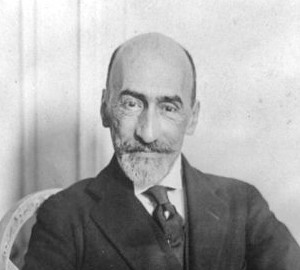August 12: Jacinto Benavente (1866)
It was on this date, August 12, 1866, that Spanish dramatist Jacinto Benavente y Martínez was born in Madrid. One of the most important Spanish dramatists of the 20th century, Benavente wrote over 170 plays, including La comida de las fieras (The Food of the Beasts, 1898), an attack on aristocrats, La Gobernadora (The Governor, aka The Passion Flower, 1901), about corrupt provincial politics, Los Malhechores del Bien (The Malefactors of the Good, 1905), about religious hypocrisy, and Los intereses creados (The Bonds of Interest, 1907), his most popular comedy, involving situations similar to those found in the Commedia dell'arte. His style of drama turned the contemporary form from formula to realism, melodrama to comedy. Indeed, Canadian historian and social critic Frank Underhill (1889-1971) said in 1937, “The theatre as it exists in Spain to-day may be regarded as his creation.”
He was awarded the Nobel Prize for Literature in 1922. Like Spanish novelists Benito Pérez Galdós and Vicente Blasco Ibáñez, and most of Spain's leading modern writers in his time, he was a thorough skeptic. Benavente described himself as a materialist in the early part of his career. In his preface to the play Santa Rusia (Holy Russia, 1932), which pays wholehearted tribute to Russia, he particularly approves its rejection of all religion. But when the Spanish Civil War broke out (1939), Benavente became a reluctant supporter of the Franco regime. It probably did not help that he fled Madrid, was captured, and spent the rest of the war under house arrest; it may also have been that he feared being exposed as a homosexual. This second, conservative half of his literary career is considered a long decline and cast a cloud over his international reputation.
Benavente died in Madrid at age 82 on 14 July 1954. It was Jacinto Benavente who said, “When one does not think what one says is when one says what one thinks” (“Cuando no se piensa lo que se dice es cuando se dice lo que se piensa”) and “I only fear my enemies when they begin to be right” (“Sólo temo a mis enemigos cuando empiezan a tener razón”).


